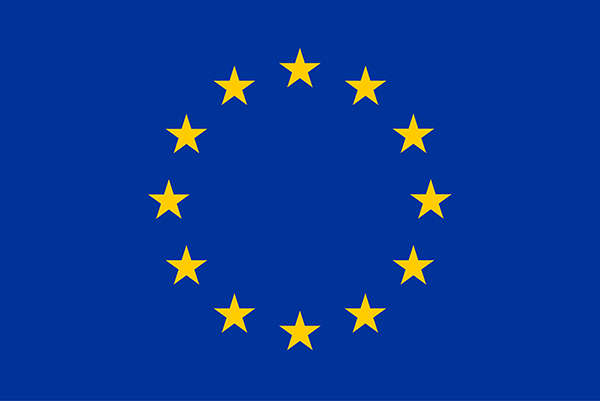ESRs
ESR 1
Martina Palatella Project: Epigenome shaping of intestinal tissue-resident memory T cell subsets Institution: Helmholtz Centre for Infection Research Supervisor: Prof. Dr. Jochen Huehn Email: martina.palatella@helmholtz-hzi.de Website: http://www.helmholtz-hzi.de/en | 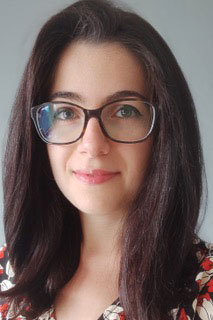 |
Biosketch:
I’m an Italian researcher. I earned a Bachelor’s degree in Biotechnology from University of Eastern Piedmont and a Master’s degree in Medical Biotechnology and Molecular Medicine from University of Milan. I did my Master thesis under the supervision of Prof. Fabio Grassi at Institute for Research in Biomedicine in Bellinzona. We developed a murine model of intergenerational malnutrition and analysed the intestinal adaptive immunity through flow-cytometry. Hence, I got specialized in mucosal immunology, investigating the role of secretory IgA and how their production is finely regulated by B cells, Tfh and Tfr cells within the Peyer’s Patches. I’m interested in intestinal immunity and in its symbiotic relationship with microbiota.
ESR 2
Phuc Huu Tran Project: Impact of CD4 lineage T cells on CD8+ T cell homeostasis Institution: Medical University of Vienna Supervisor: Prof. Dr. Wilfried Ellmeier | 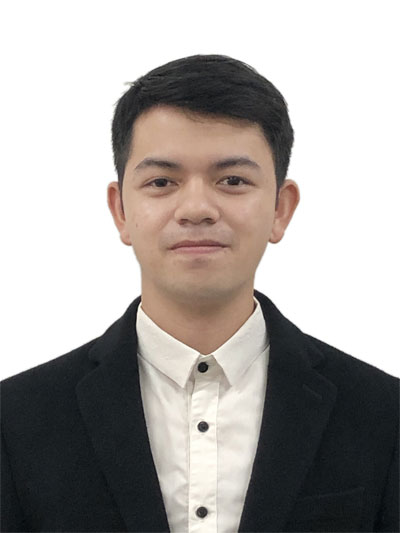 |
Biosketch:
Phuc Huu Tran - Vietnamese
Present: PhD student in Immunology, Ellmeier’s laboratory, Medical University of Vienna, Austria.
2020-2021: Research assistant in Stem cell transplantation, Hue University, Vietnam.
2018-2020: Master’s degree in Transplantation Immunology and Metabolism, Asan Medical Center – Ulsan University, South Korea.
2012-2017: Biotechnology engineering in Stem cell biology, Hue University, Vietnam
Publications:
* Experience and techniques keywords: Intraepithelial lymphocytes and CD4 CTL
Intraepithelial lymphocytes and CD4 CTL Histone deacetylases (HDACs) in the regulation of T cell-mediated immunity
Histone deacetylases (HDACs) in the regulation of T cell-mediated immunity Transplantation immunology and ceramide metabolism
Transplantation immunology and ceramide metabolism MicroRNA and mesenchymal stem cells
MicroRNA and mesenchymal stem cells
ESR 3
João Freitas Project: Understanding determinants of T cell fate decisions through repertoire analyses Institution: Ludwig-Maximilians-Universität München Supervisor: Prof. Dr. Ludger Klein Email: Joao.Freitas@med.uni-muenchen.de Website: https://www.immunologie.med.uni-muenchen.de/research_neu/klein1/index.html | 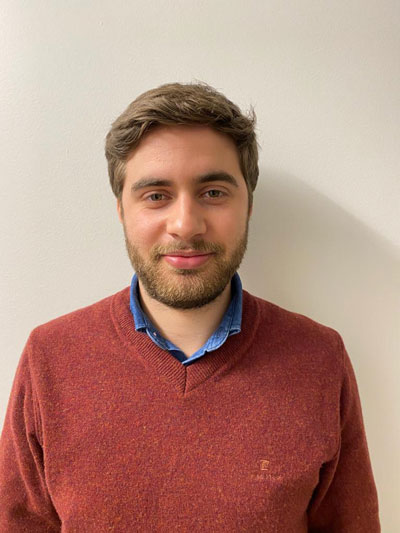 |
Biosketch:
I completed my Bachelor´s degree in Molecular and Cellular Biology in the Faculty of Science and Technology of NOVA University of Lisbon and the Oncology Master´s from the Institute of Biomedical Sciences Abel Salazar in the University of Porto in 2017 and in 2019, respectively. My Master thesis project, under the supervision of Prof. José Carlos Machado (IPATIMUP/i3S, Portugal) was entitled 'The origin of tumour-infiltrating Tregs' in mouse models. Therefore, I have developed a proficient understanding of Tregs in cancer context, as well as the management of several techniques, such as flow cytometry, RNA extraction, next generation sequencing, among others. Since that, I remain motivated to study the immune system, mainly T cell development, to improve the existent knowledge.
ESR 4
Jean-Christophe Lone Project: Molecular transition in the development of tissue-resident T cells Institution: Instituto de Medicina Molecular João Lobo Antunes, Lisbon Supervisor: Prof. Dr. Marc Veldhoen / Prof. Dr. Luis Graca Email: jchris.lone@medicina.ulisboa.pt Website: https://imm.medicina.ulisboa.pt | 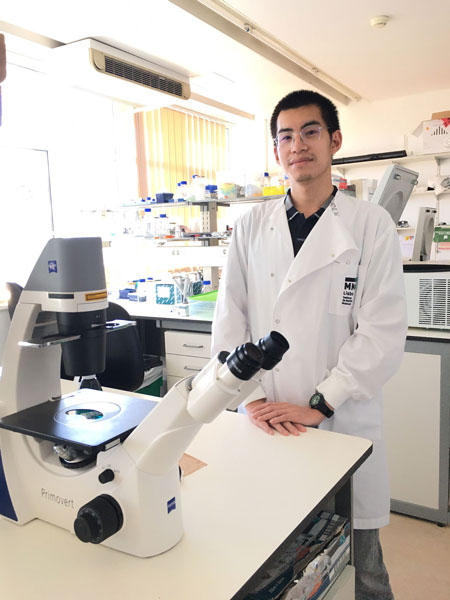 |
Biosketch:
I am a French researcher from Paris. I graduated from Agrocampus Ouest engineering school and I earned a MSc from the Université de Rennes. At the University of Essex, I studied the relationship between the microbiome and immunity and gained experience in both wet-lab immunology and data analysis. I am currently interested in the intracellular factors as well as the microenvironmental cues controlling the development, identity and activation of T resident memory cells and T follicular resident cells. In addition to my scientific interest, I co-founded the Youtube channel Statapprendra, which aims at making you like data analysis.
Publications:  www.youtube.com/channel/UC_PsZx6zW4gSb2HqTPbKblg
www.youtube.com/channel/UC_PsZx6zW4gSb2HqTPbKblg Rebout. N, Lone J.C, De Marco A., Cozzolino R., Lemasson A. & Thierry B. Measuring complexity in organisms and organizations. R. Soc. open sci. Feb 02, 2020.
Rebout. N, Lone J.C, De Marco A., Cozzolino R., Lemasson A. & Thierry B. Measuring complexity in organisms and organizations. R. Soc. open sci. Feb 02, 2020. Rebout N., De Marco A., Lone J.-C., Sanna A., Cozzolino R., Micheletta J., Sterck E.M.H, Langermans J., Lemasson A. & Bernard T. Tolerant and intolerant macaques show different levels of structural complexity in their vocal communication Proc. R. Soc. B. June 10, 2020.
Rebout N., De Marco A., Lone J.-C., Sanna A., Cozzolino R., Micheletta J., Sterck E.M.H, Langermans J., Lemasson A. & Bernard T. Tolerant and intolerant macaques show different levels of structural complexity in their vocal communication Proc. R. Soc. B. June 10, 2020.
ESR 5
Aristeidis Roubanis Project: Cell programming and metabolism of tissue-resident Tregs at steady state and during inflammatory diseases Institution: INSERM Supervisor: Prof. Dr. Benoît Salomon Email: aristeidis.roubanis@inserm.fr Website: https://www.inserm.fr | 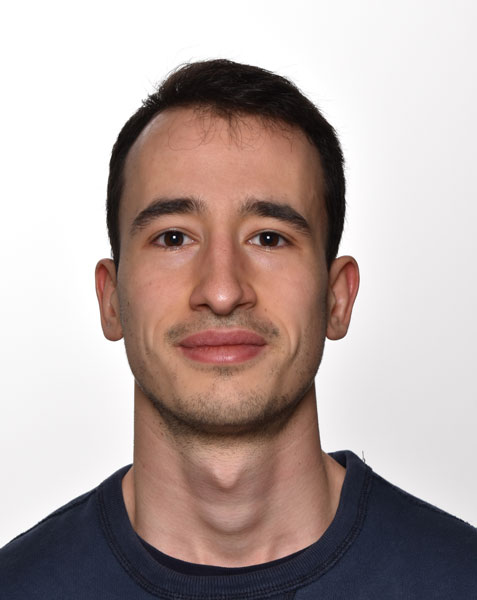 |
Biosketch:
I am French and I started my higher education in the UK. I obtained a BSc degree in biomedical science at Queen Mary University of London. With research interest in immunology, I worked at the William Harvey Research Institute on tertiary lymphoid structures in rheumatic diseases. I continued my studies with a MSc degree in Infection and Immunity at University College of London. As part of my thesis, I investigated the role of intestinal dysbiosis in the aetiopathology of Rheumatoid arthritis. During my PhD, I will be examining the metabolic adaptation of tissue-resident Tregs, primarily using conditional knockout mice.
ESR 6
Astrid Fabri Project: Can spontaneous autoimmunity help us to understand the side-effects of checkpoint immunotherapy? Institution: University College London Supervisor: Prof. Dr. Lucy Walker Email: a.fabri@ucl.ac.uk Website: https://www.ucl.ac.uk/immunity-transplantation/people/lucy-walker | 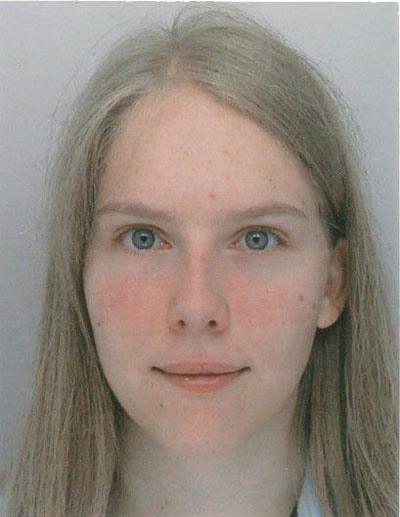 |
Biosketch:
Astrid Fabri is a Belgian researcher. She earned a doctoral degree in pharmacy from Université Claude Bernard Lyon 1 and a MSc in Immunology from Sorbonne Université. She did her PharmD thesis under the supervision of Professor Guillaume Monneret at Edouard Herriot Hospital studying IL-10 producing cells via intracellular flow cytometry in septic shock patients. She completed her MSc thesis working with Dr. Obinna Chijioke at the Institute for Experimental Immunology in Zurich on the engineering of CAR NK cells. Her research interests are translational immunology and big-data analysis.
Publications:  Fabri A, Kandara K, Coudereau R, Gossez M, Abraham P, Monard C, Cour M, Rimmele TJ, Argaud L, et al. Characterization of circulating IL-10 producing cells in septic shock patients: a proof of concept study. Front Immunol (2020) 11: doi:10.3389/fimmu.2020.615009.
Fabri A, Kandara K, Coudereau R, Gossez M, Abraham P, Monard C, Cour M, Rimmele TJ, Argaud L, et al. Characterization of circulating IL-10 producing cells in septic shock patients: a proof of concept study. Front Immunol (2020) 11: doi:10.3389/fimmu.2020.615009. Coudereau R, Waeckel L, Cour M, Rimmele T, Pescarmona R, Fabri A, Jallades L, Yonis H, Gossez M, Lukaszewicz A-C, et al. Emergence of immunosuppressive LOX-1+ PMN-MDSC in septic shock and severe COVID-19 patients with acute respiratory distress syndrome. Journal of Leukocyte Biology (2021) doi:10.1002/JLB.4COVBCR0321-129R.
Coudereau R, Waeckel L, Cour M, Rimmele T, Pescarmona R, Fabri A, Jallades L, Yonis H, Gossez M, Lukaszewicz A-C, et al. Emergence of immunosuppressive LOX-1+ PMN-MDSC in septic shock and severe COVID-19 patients with acute respiratory distress syndrome. Journal of Leukocyte Biology (2021) doi:10.1002/JLB.4COVBCR0321-129R.
ESR 7
Patryk Kret Project: Multi-species comparison of effector and regulatory T cell phenotypes and functions for routine preclinical immunotoxicological evaluation of immunomodulating therapeutic drug candidates Institution: BAYER AG Supervisor: Dr. Pascale Buchmann Email: patryk.kret@bayer.com | 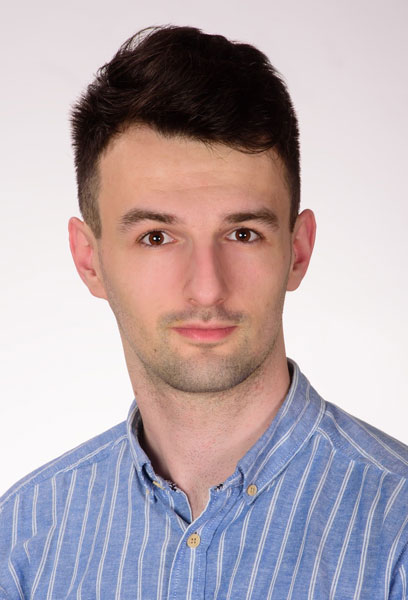 |
Biosketch:
I completed my master’s degree in Molecular Biotechnology at Jagiellonian University. During my studies, I was involved in research on regulation of cell death in neutrophils and macrophages. After graduation, I spent two years in the immuno-oncology unit of biopharmaceutical company Ryvu working in early drug discovery. The main task of our group was to develop inhibitors of MAP4K1 which is a kinase acting as a negative regulator of TCR signalling. That was my first scientific encounter with T cells, and it sparked my interest in their regulation. Currently, I am working in Bayer on comparisons of T cell phenotypes between species that are commonly used in toxicological studies.
ESR 8
Beatriz Calado Project: Modulation of 'T cell immunoglobulin and ITIM domain' (TIGIT) induction and maintenance in tissue-resident effector/memory T cells in health and disease Institution: Erasmus University Medical Center Supervisor: Dr. Janneke N. Samsom Email: m.caladodasilva@erasmusmc.nl Website: lab4childhealthrotterdam.nl | 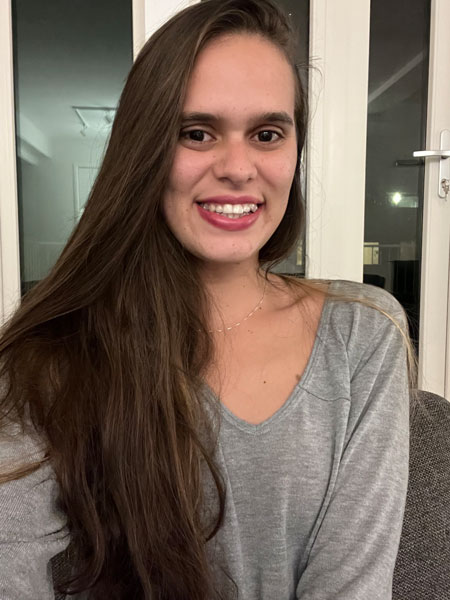 |
Biosketch:
I am a Brazilian biotechnologist with a Master’s degree in Biology Applied to Health. In light of the COVID-19 pandemic, the aim of my thesis was to understand the heterogeneity of immune responses in patients with SARS-CoV-2 infection using in silico RNA-seq data from blood, kidney, lung and heart. Comparing profiles from patients with mild and severe disease revealed activation of the interferon response and fibrosis and apoptosis pathways. During my PhD, I will investigate the functional consequences of epigenetic regulation of the co-inhibitory receptor TIGIT, also called T cell immunoreceptor with Ig and ITIM domains. In particular, I will study TIGIT function in intestinal CD4+ memory T cells in health and in pediatric patients with inflammatory bowel disease.
ESR 9
Chinna Susan Philip Project: Epigenetic biomarkers for inflammatory and autoimmune diseases Institution: UTARTU Supervisor: Prof. Dr. Pärt Peterson Email: chinna.susan.philip@ut.ee Website: https://www.biomeditsiin.ut.ee/en/research-groups/molecular-pathology | 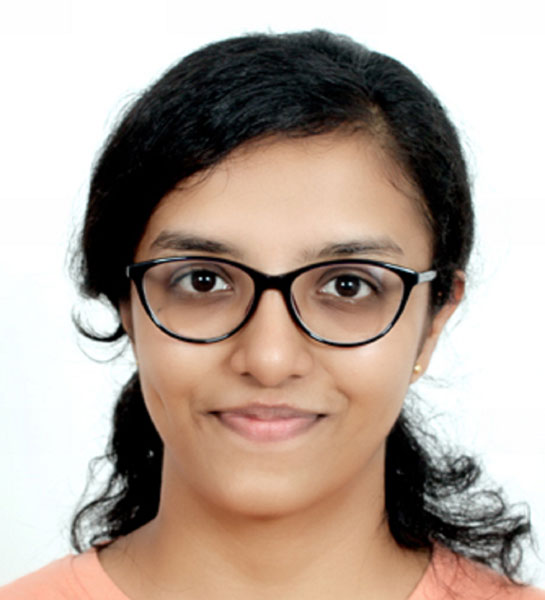 |
Biosketch:
I am from India and have completed my Bachelor’s and Master’s in Biotechnology from University of Mumbai. My Master’s dissertation project at NIRRH, Mumbai was a pilot study to comprehend the proteolytic processing of Trop2 protein in ovarian cancer cells via site-directed mutagenesis approach. After my post-graduation, I worked on understanding the epigenetic and transcriptional regulation of γδ T cells under the supervision of Prof. SV Chiplunkar at ACTREC, Tata Memorial Centre. I am looking forward to working on my PhD project by identifying key transcriptomic biomarkers involved in age-related diseases and possible exploitation of these biomarkers for therapeutics using aged mice models.
ESR 10
Stephane_Guillaume Project: Ectopic lung germinal centres as triggers of autoimmune responses Institution: Institute, University of Cambridge Supervisor: Dr. Michelle Linterman Email: stephane.guillaume@babraham.ac.uk Website: https://www.babraham.ac.uk/our-research/immunology/michelle-linterman | 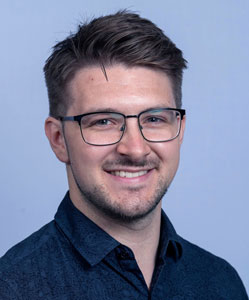 |
Biosketch:
I am a Swiss-Australian immunologist and graduate from the University of Melbourne, where I worked at the Peter Doherty Institute on tissue-resident memory CD8+ T cells. I specialised in cell line development, flow cytometry, and murine cancer and infection models to study the characteristics of CD8+ T cells in a variety of different contexts. Prior to commencing my PhD, I worked at Macomics in Cambridge, a drug discovery start-up where I developed novel cell lines in the pursuit of anti-cancer antibody development. I am very excited to be working on lung autoimmunity and inflammation for my PhD with Dr Linterman at the Babraham Institute. I look forward to investigating how immune reactions differ between healthy and diseased tissues in the germinal centres of the lung.
ESR 11
António_Sousa Project: Computational tools for analysing disease and treatment signatures Institution: University of Turku Supervisor: Prof. Dr. Laura Elo Email: aggode@utu.fi | 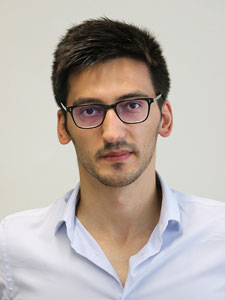 |
Biosketch:
I’m a Portuguese researcher with a BSc in Biology (2015) and a MSc in Cell and Molecular Biology (2017) both awarded by the Faculty of Sciences, University of Porto. In my master project I applied bioinformatic analyses to study the structure and function of marine Arctic microbiome below drifting sea-ice under the main supervision of Dr. Catarina Magalhães at EcoBioTec lab, CiiMAR-UP. Currently, I’m a doctoral student at Elo lab, Turku Bioscience Centre, University of Turku. During my PhD I’m interested in optimizing methods for marker identification and predicting the risk of autoimmune side-effects on cancer patients under checkpoint immunotherapy.
ESR 12
Alice Driessen Project: Mathematical and computational models of T cell-mediated immunity Institution: IBM Research GmbH Supervisor: Dr. María Rodríguez Martínez Email: adr@zurich.ibm.com Website: http://researcher.watson.ibm.com/researcher/view.php?person=zurich-ADR | 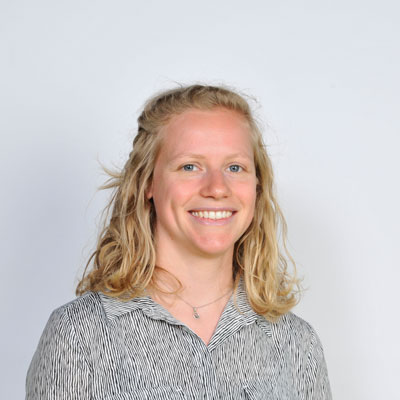 |
Biosketch:
From 2013 to 2017, I studied for the Bachelor's degree in Biomedical Sciences at Utrecht University. In 2020, I received my Master's degree in Bioinformatics and Systems Biology from the Vrije Universiteit and University of Amsterdam in the Netherlands. I worked in the Saez-lab in Heidelberg on the Single Cell Signaling in Breast Cancer Dream challenge and its CyTOF data. Also, I used mechanistic models to describe HIV infection in the Theoretical Biology group at Utrecht University. Currently, I am a Predoctoral Researcher in the Cognitive Computing & Industry Solutions department at IBM Research Zurich. Here I work towards AI-driven engineering of the immune system. My role is to develop multi-scale T cell models that can be applied in cancer immunotherapy or to auto-immune diseases.
Publications:
Attila Gabor, Marco Tognetti, Alice Driessen, Jovan Tanevski, Baosen Guo, Wencai Cao, He Shen, Thomas Yu, Verena Chung, Single Cell Signaling in Breast Cancer DREAM Consortium members, Bernd Bodenmiller, Julio Saez-Rodriguez. Cell-to-cell and type-to-type heterogeneity of signaling networks: Insights from the crowd. doi: https://doi.org/10.1101/2021.03.23.436603 (Pre-print).
ESR 13
Lisa Dratva Project: Dissection of CD4+ T cell states across human tissues Institution: Wellcome Sanger Institute Supervisor: Dr. Sarah Teichmann Email: ld21@sanger.ac.uk Website: https://www.sanger.ac.uk/ |  |
Biosketch:
I have been trained as an engineer at EPFL (Switzerland), with a strong biology component, focused on genomics, immunology and neuroscience. My background lies in analysis of and method development for single cell data and cellular atlases. For my Master thesis, I built a deep learning model to predict gene expression at the Church lab in Harvard Medical School. I have multiple experiences in industry, both with big pharma and small start-ups. My special interest is synthetic biology and I have been active in the community since my participation in iGEM 2017. As an ESR, my goal is to advance our understanding of the immune system and support translational efforts into the clinic using the most promising methods to investigate and model data.
Publications:
La Manno G, Siletti K, Furlan A, Gyllborg D, Vinsland E, Mossi Albiach A, Mattsson Langseth C, Khven I, Lederer AR, Dratva LM, Johnsson A. Molecular architecture of the developing mouse brain. Nature. 2021 Aug;596(7870):92-6.
ESR 14
Ihor Filippov Project: Bioinformatics solution for identification of epigenetic signatures in TRM cell subsets Institution: QIAGEN Supervisor: Dr. Leif Schauser Email: ihor.filippov@qiagen.com | 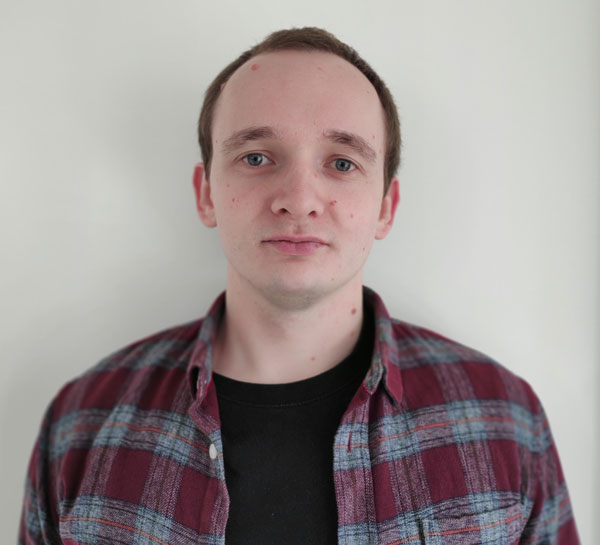 |
Biosketch:
I completed my MSc degree at Ghent University in 2021. I did my thesis on the methods for gene regulatory network reconstruction under Prof. Vanessa Vermeirssen. While analysing multi-omics single-cell datasets, I developed a strong interest in integrating heterogeneous molecular signals to study the cell type-specific regulatory code. I am excited to join Pärt Peterson’s lab at Tartu University and Qiagen Aarhus, where I have an opportunity to work with large-scale immunological data. By applying cutting-edge computational approaches to transcriptomic, epigenomic, and immune repertoire profiles, I plan to uncover how T cells change during ageing. Of particular interest are biomarkers of age-related diseases that can be clinically relevant.
ESR 15
Francisco Javier Botey Bataller Project: Dynamics of T cell transcriptome and eQTLs in response to stimulations Institution: Radboud University Medical Center Supervisor: Prof. Dr. Yang Li Email: javier.botey@helmholtz-hzi.de Website: https://www.ciim-hannover.de/de/forschung/forschungsgruppen/gruppe-yang-li | 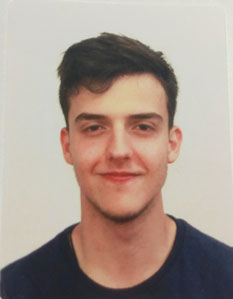 |
Biosketch:
I am a Spanish researcher. I completed my bachelor’s degree in Biotechnology at the Polytechnic University of Valencia and my master’s degree in Translational Medical Research at the University of Heidelberg. Furthermore, I carried out my master thesis at the German cancer research centre (DKFZ) in somatic mutation calling and mutational signature analysis of a skin cancer model. After that, I studied a master in Bioinformatics and Biostatistics (Open University of Catalonia/University of Barcelona) and worked as a student research assistant in T cell immunology (Technical University of Munich). My main interest is the use of novel data science methods for multi-omics analysis.

